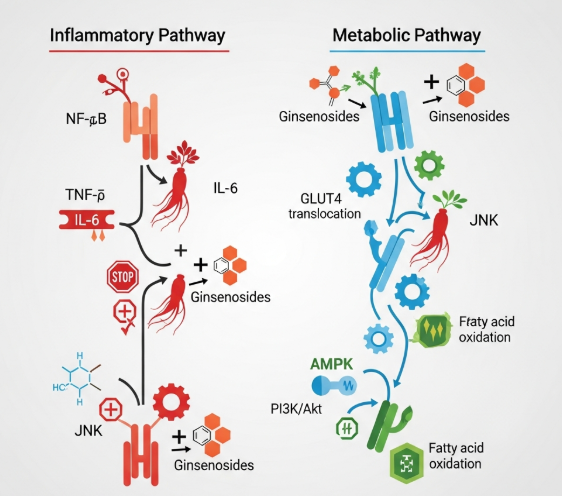🔬 Introduction: The Missing Link Between Immunity & Insulin Resistance
Most people think insulin resistance only comes from sugar, carbs, or lack of exercise. But current research reveals a far deeper root cause: metabolic inflammation—an immune response that alters how cells use glucose, store fat, and process energy.
This chronic low-grade inflammation (often called meta-inflammation) affects the brain, liver, muscle, and even mitochondria. Over time, it disrupts insulin signaling, elevates blood sugar, and accelerates aging.
One natural ingredient that has gained increasing scientific attention in this area is Korean Red Ginseng (Panax ginseng Meyer).
Unlike simple herbs or stimulants, red ginseng contains bioactive ginsenosides that interact with cellular pathways linked to inflammation, oxidative stress, immune regulation, and insulin receptor sensitivity.
This article explores how immune-driven metabolic dysfunction develops — and how Korean red ginseng may support healthier glucose and metabolic balance through an immune-modulatory approach.
🧬 Section 1: How Metabolic Inflammation Starts in the Immune System
Understanding the “Silent Fire”
Chronic inflammation isn’t the same as an infection. Instead, it is a slow-burning immune activation triggered by:
- High sugar + processed foods
- Toxic lipid metabolites
- Visceral fat
- Sedentary behavior
- Mitochondrial dysfunction
- Environmental toxins
- Chronic stress & cortisol abnormalities
This inflammation primarily affects metabolic organs, especially liver, muscle, adipose tissue, and pancreas.
Key Immune Signaling Molecules in Insulin Resistance:
| Inflammatory Molecule | Effect |
|---|---|
| TNF-α | Blocks insulin receptor signaling |
| IL-6 | Drives hepatic glucose production |
| IL-1β | Damages pancreatic beta cells |
| CRP | Marker of systemic inflammation |
| NF-κB | Master switch of inflammatory gene expression |
| ROS | Damages cellular mitochondria & insulin receptors |
This immune response directly interferes with insulin signaling by blocking IRS-1, GLUT4, and PI3K/Akt pathways.
🧠 Section 2: Why Insulin Resistance Begins Before Blood Sugar Rises
Insulin resistance develops long before fasting glucose changes — sometimes years beforehand.
The sequence often looks like:
- Chronic inflammation
- Mitochondrial stress
- Disrupted insulin signaling
- Compensatory high insulin
- Beta-cell fatigue
- High blood sugar
- Clinical diabetes
The immune system is the spark, not the result.
🌿 Section 3: Korean Red Ginseng & Immune-Based Insulin Support
Korean Red Ginseng contains more than 30+ major ginsenosides, including:
- Rb1
- Rg1
- Rg3
- Rh2
- Rk1
- Compound K
- Ginsenoside Re
These compounds have been studied for their bioactive immuno-metabolic activities.
⚙ Key Mechanisms of Action
- Suppresses inflammatory cytokines
- TNF-α
- IL-6
- IL-1β
- NF-κB pathways
- Improves insulin receptor sensitivity
- Increases GLUT4 translocation
- Activates AMPK
- Increases adiponectin
- Supports mitochondrial energy metabolism
- Reduces oxidative stress
- Enhances ATP production
- Improves mitochondrial biogenesis
- Regulates adipokine signaling
- Lower leptin resistance
- Higher adiponectin
- Modulates gut-immune axis
- Supports fermentation to Compound K
- Promotes anti-inflammatory SCFA production
📚 Section 4: Scientific Evidence Summary
Human Trials
- Some studies show improvement in fasting glucose and HbA1c when red ginseng is used in conjunction with lifestyle changes.
- Observational data suggests improved insulin sensitivity and lower inflammation biomarkers.
Animal & Cellular Studies
- Ginsenoside Rg3 decreases TNF-α and IL-6 in liver and adipose tissue
- Compound K enhances glucose uptake through AMPK activation
- Rb1 improves insulin signaling in muscle cells
- Korean red ginseng extract reduces oxidative stress in pancreatic beta cells
📌 Note: These findings support functional benefits but do not replace medical treatment. Korean red ginseng is not a cure for diabetes.
🧠 Section 5: Red Ginseng vs Other Approaches
| Approach | Works On | Limitations |
|---|---|---|
| Low-carb diet | Blood sugar spikes | Does not address immune root cause |
| Exercise | Insulin sensitivity | Requires consistency |
| Supplements like berberine | AMPK activation | Not immune-modulating |
| Korean Red Ginseng | Immune + metabolic + mitochondrial pathways | Must be used consistently |
Korean red ginseng is uniquely positioned in metabolic health because it targets the immune dysfunction behind insulin resistance.
🩺 Section 6: Who Might Benefit?
May be relevant for individuals who are:
- Experiencing chronic fatigue with blood sugar fluctuations
- Pre-diabetic or have insulin resistance patterns
- Have metabolic inflammation or central fat storage
- Experiencing high stress or cortisol dysregulation
- Addressing autoimmune or inflammatory complications
📌 Always consult a healthcare professional before using herbal supplements for medical conditions.
🧪 Section 7: Choosing the Right Type of Korean Ginseng
The most studied form for metabolic pathways is:
🔺 Korean Red Ginseng Extract (6-year roots)
Not the same as white ginseng, American ginseng, or cheap powdered roots.
Look for:
✔ Standardized ginsenoside content
✔ 6-year cultivated roots
✔ Fermented or enzymatically processed options
✔ GMP-certified extraction







